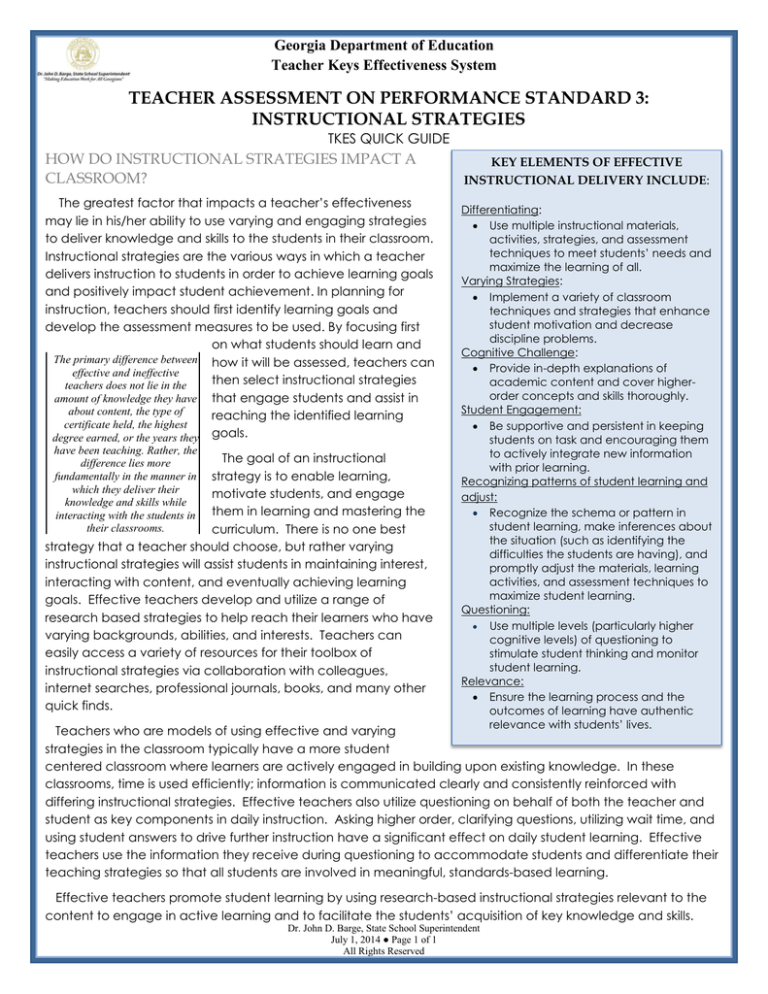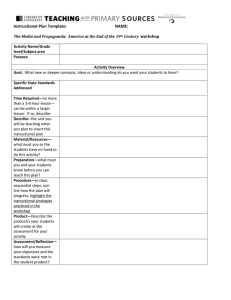
Georgia Department of Education
Teacher Keys Effectiveness System
TEACHER ASSESSMENT ON PERFORMANCE STANDARD 3:
INSTRUCTIONAL STRATEGIES
TKES QUICK GUIDE
HOW DO INSTRUCTIONAL STRATEGIES IMPACT A
CLASSROOM?
The greatest factor that impacts a teacher’s effectiveness
may lie in his/her ability to use varying and engaging strategies
to deliver knowledge and skills to the students in their classroom.
Instructional strategies are the various ways in which a teacher
delivers instruction to students in order to achieve learning goals
and positively impact student achievement. In planning for
instruction, teachers should first identify learning goals and
develop the assessment measures to be used. By focusing first
on what students should learn and
The primary difference between how it will be assessed, teachers can
effective and ineffective
then select instructional strategies
teachers does not lie in the
amount of knowledge they have that engage students and assist in
about content, the type of
reaching the identified learning
certificate held, the highest
degree earned, or the years they goals.
have been teaching. Rather, the
difference lies more
fundamentally in the manner in
which they deliver their
knowledge and skills while
interacting with the students in
their classrooms.
The goal of an instructional
strategy is to enable learning,
motivate students, and engage
them in learning and mastering the
curriculum. There is no one best
strategy that a teacher should choose, but rather varying
instructional strategies will assist students in maintaining interest,
interacting with content, and eventually achieving learning
goals. Effective teachers develop and utilize a range of
research based strategies to help reach their learners who have
varying backgrounds, abilities, and interests. Teachers can
easily access a variety of resources for their toolbox of
instructional strategies via collaboration with colleagues,
internet searches, professional journals, books, and many other
quick finds.
KEY ELEMENTS OF EFFECTIVE
INSTRUCTIONAL DELIVERY INCLUDE:
Differentiating:
• Use multiple instructional materials,
activities, strategies, and assessment
techniques to meet students’ needs and
maximize the learning of all.
Varying Strategies:
• Implement a variety of classroom
techniques and strategies that enhance
student motivation and decrease
discipline problems.
Cognitive Challenge:
• Provide in-depth explanations of
academic content and cover higherorder concepts and skills thoroughly.
Student Engagement:
• Be supportive and persistent in keeping
students on task and encouraging them
to actively integrate new information
with prior learning.
Recognizing patterns of student learning and
adjust:
• Recognize the schema or pattern in
student learning, make inferences about
the situation (such as identifying the
difficulties the students are having), and
promptly adjust the materials, learning
activities, and assessment techniques to
maximize student learning.
Questioning:
• Use multiple levels (particularly higher
cognitive levels) of questioning to
stimulate student thinking and monitor
student learning.
Relevance:
• Ensure the learning process and the
outcomes of learning have authentic
relevance with students’ lives.
Teachers who are models of using effective and varying
strategies in the classroom typically have a more student
centered classroom where learners are actively engaged in building upon existing knowledge. In these
classrooms, time is used efficiently; information is communicated clearly and consistently reinforced with
differing instructional strategies. Effective teachers also utilize questioning on behalf of both the teacher and
student as key components in daily instruction. Asking higher order, clarifying questions, utilizing wait time, and
using student answers to drive further instruction have a significant effect on daily student learning. Effective
teachers use the information they receive during questioning to accommodate students and differentiate their
teaching strategies so that all students are involved in meaningful, standards-based learning.
Effective teachers promote student learning by using research-based instructional strategies relevant to the
content to engage in active learning and to facilitate the students’ acquisition of key knowledge and skills.
Dr. John D. Barge, State School Superintendent
July 1, 2014 ● Page 1 of 1
All Rights Reserved




